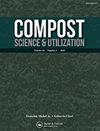Preplant Soil Incorporation of Compost to Mitigate Replant Disease: Soil Biological Factors Associated with Plant Growth Promotion in Orchard Soil
IF 0.9
4区 农林科学
Q3 ECOLOGY
引用次数: 1
Abstract
Abstract Preplant soil incorporation of compost has previously shown potential to suppress Pratylenchus penetrans populations and improve replant establishment of newly planted fruit trees at old orchard sites. Using a greenhouse experiment, we evaluated the effects of preplant incorporation of three compost amendments (agricultural waste compost, yard trimmings compost, and municipal waste compost) on growth of apple seedlings, P. penetrans populations, microbial populations associated with soil suppressiveness, and microbial activity using soil collected from three orchard sites. We also aimed to identify the biological factors that were most strongly associated with enhanced plant growth in compost-amended soil. In four out of nine compost type × soil combinations, compost improved apple seedling growth relative to the control. In four out of nine compost type × soil combinations, compost reduced P. penetrans root infestation relative to the control, and in one compost type × soil combination, compost amendment increased P. penetrans root infestation. Composts stimulated soil microbial activity and abundance, resulting in greater populations of Pseudomonas spp. in soil in seven of the nine compost type × soil combinations. In a step-wise multiple linear regression, P. penetrans root infestation and the total abundance of fungi in soil accounted for the most variance in plant biomass, with increases in both variables correlated with reduced seedling biomass. Overall, composts show variability in the capacity to promote the establishment of fruit trees in orchard soil. Future research should be directed toward understanding variability in compost-induced plant growth promotion among different orchard soils and compost types.果园土壤中与植物生长促进相关的土壤生物因子研究
摘要在种植前土壤中掺入堆肥可以抑制粗齿叶蝉的种群数量,提高果园旧址新栽果树的再植率。通过温室试验,我们利用从三个果园收集的土壤,评估了种植前加入三种堆肥添加剂(农业废弃物堆肥、庭院修剪堆肥和城市垃圾堆肥)对苹果幼苗生长、渗透线虫种群、与土壤抑制相关的微生物种群和微生物活性的影响。我们还旨在确定与堆肥改良土壤中植物生长最密切相关的生物因素。在9个堆肥类型×土壤组合中,堆肥对苹果幼苗的生长有明显的促进作用。在9种混合类型×土壤组合中,4种混合类型×土壤组合中,堆肥相对于对照减少了穿山杨的根系侵染,在1种混合类型×土壤组合中,堆肥改良剂增加了穿山杨的根系侵染。堆肥提高了土壤微生物的活性和丰度,导致9种混合类型×土壤组合中有7种土壤中假单胞菌的数量增加。在逐步多元线性回归中,渗透根侵染和土壤真菌总丰度对植物生物量的影响最大,这两个变量的增加与幼苗生物量的减少相关。总体而言,堆肥在促进果园土壤中果树形成的能力方面表现出变异性。今后的研究应着眼于了解堆肥在不同果园土壤和堆肥类型中促进植物生长的变异性。
本文章由计算机程序翻译,如有差异,请以英文原文为准。
求助全文
约1分钟内获得全文
求助全文
来源期刊

Compost Science & Utilization
农林科学-生态学
CiteScore
4.10
自引率
0.00%
发文量
0
审稿时长
>36 weeks
期刊介绍:
4 issues per year
Compost Science & Utilization is currently abstracted/indexed in: CABI Agriculture & Environment Abstracts, CSA Biotechnology and Environmental Engineering Abstracts, EBSCOhost Abstracts, Elsevier Compendex and GEOBASE Abstracts, PubMed, ProQuest Science Abstracts, and Thomson Reuters Biological Abstracts and Science Citation Index
 求助内容:
求助内容: 应助结果提醒方式:
应助结果提醒方式:


